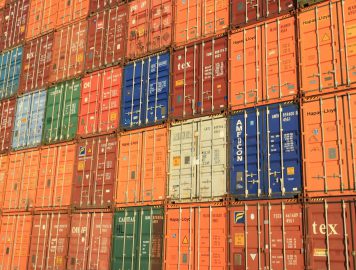Foreign trade with SAP GTS
SAP Global Trade Services (SAP GTS) is a solution provided by SAP that helps companies manage their global trade activities, comply with legal regulations, and, most importantly, optimize cross-border trade by automating and digitizing processes.
An excerpt from the range of services offered by SAP GTS

Import and export control
SAP GTS offers comprehensive functions and tools for efficient management and compliance with import and export control regulations, including automated compliance checks integrated into business processes.

Customs clearance
SAP GTS supports you in the efficient processing of imports and exports through automated data transfer from pre-fillings and electronic communication with customs authorities.

Intrastat
SAP GTS supports you in the periodic creation of the Intrastat declaration for your intra-community trade by automating the collection of relevant business transactions and transferring them into the required reporting format.

Classification
SAP GTS supports you in the tariffing of your products by assigning statistical commodity numbers and tariff numbers, which are required for further GTS processes such as customs and preference processing.

Long-Term Vendor Declarations
SAP GTS supports you in the management, request, and creation of supplier declarations. Automatically, relevant products and prices are determined based on business transactions of the issuing period to ascertain preference eligibility.

Preference Calculation
The preference eligibility of your products is determined using automated preference calculation based on valid preference regulations and bills of materials.
SAP GTS - Overview of the functional range
Compliance Management
Compliance Management in SAP GTS offers various functions that support companies in complying with import and export control regulations. The components of sanction list screening, embargo checking, and legal control enable the monitoring of licensable transactions and compliance with legal regulations that restrict or prohibit trade with countries, political groups, and individuals.
Sanctioned Party List Screening
Sanctioned party list screening ensures that companies do not maintain business relationships with sanctioned individuals or organizations. To achieve this, all document and business partner data from the utilized subsystems are compared with the current sanction lists. In case of matches, the corresponding documents or business partners are automatically blocked to ensure that no further business relationships can be established, and for example, deliveries or the confirmation of new orders are prevented. The blocked data is included in a work queue, where it undergoes detailed examination and final assessment (release or block) by the relevant department.
Embargo Check
The embargo check in SAP GTS ensures that the legal regulations for business relationships with embargoed countries are verified and adhered to. To accomplish this, the countries from the partner data of the document data from the source system are compared with the embargoed countries maintained in SAP GTS. In case of matches, the corresponding documents are blocked to ensure that the necessary approvals and documents can be obtained before delivering the goods or confirming the order to the customer. The blocked documents are included in a work queue, where they are ready for detailed examination and final assessment (release or block) by the relevant department
Legal Control
Legal control ensures compliance with applicable regulations for trading in products requiring authorization (such as Dual-Use Goods). To achieve this, the products are compared based on the recipient or destination country from the document data of the source system with the product classifications stored in SAP GTS. Depending on the authorization requirements, authorizations stored in the system can be automatically found during the check. If no authorization is found, for example, because an individual authorization needs to be applied for, the document is blocked until final processing (release or block) by the relevant department, ensuring that subsequent activities such as order confirmation or goods delivery cannot be carried out.
Customs Management
Customs Management in SAP GTS assists companies in processing imports and exports. SAP GTS offers, among other things, the option of electronic communication with the customs authorities of individual countries as well as options for automating data entry for customs declaration. This accelerates and automates the customs clearance process, helping to reduce the overall costs associated with legally relevant transactions.
Import
When goods are received from a third country (purchases or returns), they must be presented to the customs authorities, i.e., declared. Subsequently, within a specified period, they must be transferred to a customs procedure (such as free circulation). For this purpose, an import customs declaration must be created, based on which the customs authority determines the applicable import duties such as customs duties and taxes. In SAP GTS, this is done based on pre-fillings such as orders or deliveries from the source systems and customs-specific master data such as the customs tariff number, which is stored in the GTS product master. This significantly reduces manual data entry efforts. Additionally, communication with the customs authority can be done electronically, enabling requests and approvals to be sent and received without delay, further speeding up and streamlining the entire import process.
Export
When goods are delivered to a third country (sale or return), they must be declared to the customs authority. For this, an export declaration is created. SAP GTS generates this export declaration based on pre-fillings, typically pro forma invoices from the source systems, and supports various customs procedures such as the simplified procedure. All data is transferred from the pre-fillings during export and supplemented with customs-specific master data, reducing manual data entry and accelerating processing. Similarly, communication with the customs authority is done electronically, allowing requests and approvals to be sent and received without delay, enhancing the efficiency of the export process and enabling faster processing.
Electronic Compliance Reporting
Electronic Compliance Reporting in SAP GTS assists companies in fulfilling their legal obligations regarding intra-community trade within the European Union. It enables the automated creation and submission of statistical reports (INTRASTAT) to the competent authorities of the EU member states. These data are used to make statements about intra-European trade and thus the economic activity of the EU. SAP GTS uses document data derived from the logistics processes of the respective reporting period and generates the required Intrastat reports from it.
Risk Management
Risk Management in SAP GTS provides companies with the opportunity to reduce the financial risk associated with their foreign trade activities. The components of preference processing, letter of credit processing, and export refund can be integrated into the standard processes for handling foreign trade processes.
Preference processing
Preference processing in SAP GTS assists companies in fulfilling the necessary legal requirements for customs preferences. Customs preferences allow customers located in a third country to import goods duty-free or at a reduced duty rate, providing the exporter with a price advantage and thus strengthening their competitiveness.
In SAP GTS, the preference eligibility of products is determined based on preference calculation (taking into account preference agreements and product bills of materials) as well as existing supplier declarations. Additionally, there is the option to request and manage supplier declarations from the supplier side and to create customer-side supplier declarations. Communication with business partners can be done entirely electronically.
Letter of Credit Processing
SAP GTS provides functions for managing and monitoring letters of credit, which are used to secure financial risks for import and export transactions. The received letters of credit from the bank can be maintained in the system and supplemented with all relevant delivery and document data to assign them to import and export documents. This enables status monitoring of the letters of credit. The system automatically recognizes when your import or export business partner is relevant for letter of credit processing and prompts you to assign a letter of credit to this business partner.
Restitution
SAP GTS unterstützt Unternehmen mit der Funktion „Ausfuhrerstattung“ bei der Beantragung von Exportsubventionen. Dabei prüft GTS die Rechnungen für relevante Auslieferungen auf Produkte, die für die Ausfuhrerstattung relevant sind, und ermittelt, ob eine Erstattungsrelevanz besteht. Zudem wird überprüft, ob für die erstattungsrelevanten Produkte eine Ausfuhrgenehmigung erforderlich ist und gegebenenfalls noch beantragt werden muss. Die Software ermittelt die Erstattungssätze, schreibt die Werte von Ausfuhrgenehmigungen ab und erzeugt die benötigten Formulare für die Zollbehörden.





